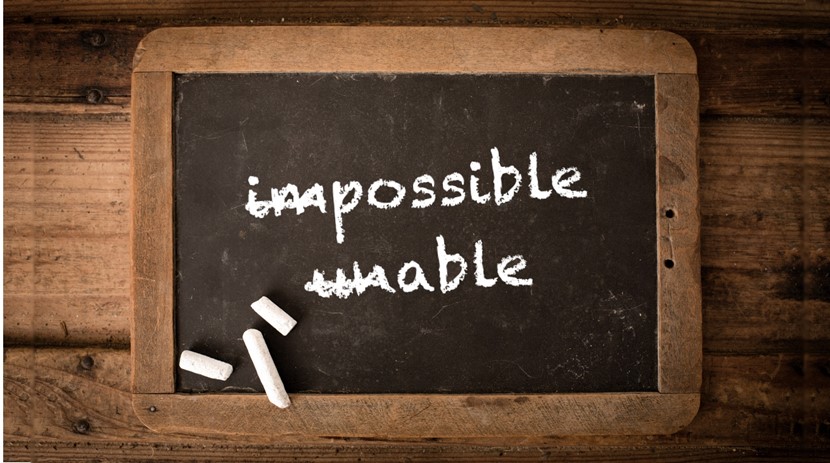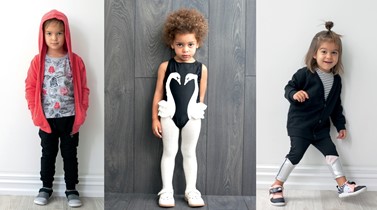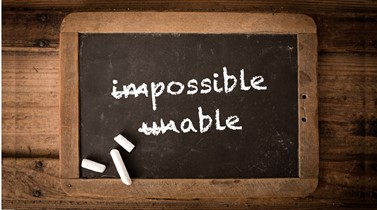How to encourage a growth mindset

Gretchen Carroll explores how parents can help their children to love challenges, rather than worry about failure.
If at first you don't succeed, try, try, try again. You may well have grown up with this ancient adage, or found yourself quoting it to your own kids. Now this keep-at-it philosophy is experiencing fresh appreciation. American researcher Dr Carol Dweck has coined the term 'having a growth mindset' – a term which is increasingly being talked about in the media, education settings and workplaces.
So what is a growth mindset, and how does it differ from the flip side, a fixed mindset? In her book, Mindset: How you can fulfil your potential, Dweck says “Think of a time you were enjoying something, then it became hard and you wanted out. This is the fixed mindset. Now picture your brain forming new connections as you meet the challenge and learn, and keep on going. This is the growth mindset”.
Dweck poses the interesting idea that at times during your life when someone has done better than you, instead of considering the person to be smarter or more talented, perhaps they just used better strategies, taught themselves more, practised harder and worked their way through obstacles. She encourages people not to see every lapse as spelling doom but a clue about how to do it better next time and a reminder that you’re an unfinished human being.
In general terms, someone with a fixed mindset sees intelligence as static. This results in a person wanting to look smart, so therefore they tend to avoid challenges, get defensive or give up easily. They see effort as fruitless, or worse, they ignore useful negative feedback, and feel threatened by others’ success. Dweck says, as a result, these people can plateau early and achieve less than their full potential.
On the other hand, someone with a growth mindset sees intelligence as something that can be developed. This leads them to embrace challenges, persist in the face of setbacks and see effort as the path to capability. They learn from criticism, and find lessons and inspiration in the success of others, therefore reaching even higher levels of mastery.
Young mindsets
The concepts surrounding growth versus fixed mindsets contain important life lessons for us as parents. Recognising our own mindset is not only good for our personal development in work and life, it is important when we are helping our children develop theirs.
Dweck has studied children’s mindsets extensively – what happens when they are faced with big challenges, and why some embrace them and others don’t. She found that when kids with fixed mindsets face a difficult challenge, they tend to give up or avoid the task, look to cheat or gravitate towards children who perform worse, so in comparison they seem to be achieving. This is because they don’t want to look 'dumb', and failure is intrinsically seen as a bad thing.
Kids with a growth mindset keep trying, even if they make mistakes along the way. They tend to outperform their peers on tests and examinations, as well as develop vital skills like persistence and resilience. You could say they become better learners.
Dweck found schools in low socio economic areas in the United States (with typically low pass rates) that have encouraged growth mindsets have had
a big turnaround. She applauds one school which talks about 'not yet' rather than 'fail'. By giving the grade 'not yet', the teachers are recognising the difficulty of the task, and instilling confidence in the child that they can still do it.
Home help
'High expectations' is one of the eight principles of the New Zealand Curriculum from Year One onwards. The Ministry of Education encourages teachers to use the approach of promoting a growth mindset to help students achieve personal excellence. But it's not too early for parents of toddlers and preschoolers to help their kids develop a growth mindset, as it will make a difference once they reach school. If a child tends towards perfectionism naturally, growth mindset will be a particularly helpful approach for them to develop to counterbalance the tendency to worry about making mistakes.
Choose your words
One key thing to think about is how we use praise. Parents should aim to support their children to give things a go, and enjoy learning as a process, rather than praising children for being smart. It turns out that praise such as “well done” and “aren’t you clever” is not helpful. This sort of praise can reinforce the idea that some people are naturally clever, and effort is something only those who are less smart need to put in. Instead we need to be specific, and focus on how the outcome was achieved. For example, "I can see how much effort you put into making that tower".
Noticing and commenting on effort rather than ability makes a world of difference, and helps the child develop a growth mindset. Comments such as “Remember when you couldn’t and now you can” boost children’s confidence that, with practice and effort, results will come. For example: “Wow, you’ve been working on riding your balance bike every day this week. Do you remember how last week you could only use your tiptoes and walk the bike? Now you can get up to speed and glide sometimes!”. This recognises a physical development, which a preschooler can relate to easily. Your comments remind them that learning something new can take a long time, and teaches them that (contrary to the old saying) practice makes better, not perfect!
Consider your reactions
Children can’t identify if we have a growth or fixed mindset, but they can see how we react to failure. When parents view failure as negative, they tend to worry about the child’s ability, and over-comfort them. Over time, this can mean their child tends to give up, and develops a fixed mindset. Conversely, if parents view failure as constructive, they encourage their child to see mistakes as a learning process; to keep trying and seek extra help.
When children don’t succeed in resolving a challenge, they sometimes need a few minutes to feel disappointed. That’s normal and perfectly okay. It’s important to recognise that frustration is a natural emotion, we all feel it and it shouldn’t be actively avoided in children. It is more about how we recover from frustration and if we let it crush us. The sooner a child recovers from disappointment and moves into resiliency mode, the sooner they can solve the problem.
American teachers Shelby Pawlina and Christie Stanford have written about developing a growth mindset. They talk about 'bouncing like a ball' rather than 'flopping like a bean bag' with their preschool students when they feel disappointment. These similes help the children understand the concepts, and present a fun, visual explanation which they can relate to. These might be useful ways to describe different reactions to your children.
As well as considering the types of praise we use and helping our kids to recover from frustration, we can also impart helpful problem-solving strategies. When your child is faced with a problem, encourage them to identify what the matter is, and think of three ways to handle it. Let them then try the possible solutions out, and evaluate them afterwards with you. This evaluation may simply be you acknowledging how they worked to solve the problem. With practice, children internalise this process as a problem-solving routine. By developing a growth mindset, children improve their skills for effectively solving problems every day, and in increasingly challenging scenarios.
Nature vs nurture
Dweck says what has intrigued her the most in 30 years of research is the power of motivation. “Many creative geniuses were not born that way. They were often fairly ordinary people who became extraordinarily motivated. By motivation, I mean not only the desire to achieve, but also the love of learning, the love of challenge, and the ability to thrive on obstacles.”
Anders Ericsson focusses on this same idea in his book Peak. He has found, rather than innate talent being the key factor for success, it’s the practice people put into developing a skill. Often children are pushed away from something because they are not 'sporty' or 'musical'. More attention is given to those who are seen as naturally talented in that area. Both sides of the coin become self-fulfilling prophecies – the good get better, and those who were told they were no good are never given the chance, don’t develop that skill set further, and grow up believing it. All young children should be encouraged to give everything a go, and to keep working at getting better at a skill. Dweck sums up the ultimate gift parents can give. “If parents want to give their children a gift, the best thing they can do is teach their children to love challenges, be intrigued by mistakes, enjoy effort and keep on learning.”
HELP INISTIL A GROWTH MINDSET
● Everyone makes mistakes, so embrace your own and stay calm in front of your children. “Oh, I’m frustrated I spilt the milk, but that’s okay, everyone makes mistakes. Next time I won’t pour it so close to the edge.”
● Use praise that says you’re a developing person and I’m interested in your development.
● Give them opportunities to solve appropriate problems on their own. If the problem is manageable, they also experience success.
● Don’t react negatively when they make a mistake or have a setback.
● Reinforce that practice makes better, not perfect.
● Avoid words such as fast, easy and perfect.
● Talk about your own challenges at work, or in another area, and how you are approaching them.
Gretchen Carroll lives in Auckland with her husband and son. She works as a freelance writer, allowing her more time to spend with their preschooler.

AS FEATURED IN ISSUE 37 OF OHbaby! MAGAZINE. CHECK OUT OTHER ARTICLES IN THIS ISSUE BELOW

















